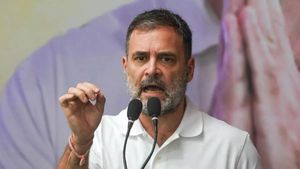Poland's Deputy Foreign Minister, Andrzej Szejna, finds himself at the center of scrutiny as investigations loom over his expense reimbursements, raising significant questions about accountability within the government.
The Prokuratura Rejonowa Kielce-Zachód has initiated proceedings focusing on alleged irregularities concerning Szejna's business travel expenses, known widely as 'kilometrówki', from November 2019. Reports indicate Szejna, who is affiliated with the political party Lewica, had claimed over 122,000 PLN (approximately 27,000 USD) for mileage reimbursements, particularly during the height of the COVID-19 pandemic, when he received sums of 34,500 PLN and 35,000 PLN from the Polish Parliament.
The recent inquiry was sparked by an anonymous tip-off, pushing local police to investigate the claims. "The results of this verification indicate the necessity for legal clarification of the affair," stated sources from the prosecutor’s office, detailing the probe aims to establish whether any illegal activity occurred and to identify possible offenders.
While detailing the investigation, the prosecutor's office previously released statements, confirming, "The District Prosecutor's Office is investigating irregularities concerning the operations of the parliamentary office and reimbursement claims, known as kilometrówki, made by one member of the Polish Parliament during the IX and X terms, from November 2019 onwards." According to information acquired by Wirtualna Polska, this investigation pertains to Szejna.
Following initial inquiries, official comments emerged from the Ministry of Foreign Affairs. Spokesman Paweł Wroński remarked, "The ministry finds the matter unknown. It pertains to the time when Andrzej Szejna was merely a member of parliament, not the secretary of state at the ministry. We hope for swift and positive clarification from the minister."
Andrzej Szejna, who was elected to the Sejm in 2019 and re-elected successfully four years later, previously held various governmental positions, including service as deputy minister of the Ministry of Economy during Leszek Miller's administration. Given the recent controversies involving other officials within the Lewica party, such as the dismissal of Minister Dariusz Wieczorek for exposing whistleblower information and the prosecution of former Deputy Minister Bartłomiej Ciążyński for exceeding authority, Szejna's situation adds to the political tension.
Reportedly, Szejna has expressed his willingness to cooperate fully with the investigation and insists every financial claim has been filed correctly. His spokesperson, Łukasz Michnik, defended Szejna's track record, asserting, "All expenditures for kilometrówki were duly justified and validated. Despite the pandemic era restrictions, he consistently fulfilled his obligations for the party. The Sejm Office never flagged any irregularities concerning these reimbursements."
Despite Szejna's positive assertions and support from his party, the tumultuous political climate raises suspicions and questions from constituents and political observers alike, especially with recent revelations of improper actions by fellow lawmakers.
Taking the matter seriously, the prosecutor's office reiterated, "A preparatory investigation will be initiated, during which evidence will be collected to determine all important circumstances of the case, including whether prohibited acts were committed or who may be responsible."
Notably, the financial claims are particularly alarming, considering they coincide with the peak of the pandemic when public scrutiny on governmental operations intensified. It emphasizes the sensitivities surrounding public funds' allocation, especially during crises. Szejna's annual remuneration reportedly totals around 166,000 PLN, alongside additional allowances of approximately 45,500 PLN, generating greater interest among citizens concerned about governmental spending habits.
Following protests and political shifts, many may question whether Szejna can maintain his position unscathed. With the workings of his office garnering attention for possible accountability issues, this could signal the beginnings of wider reforms within the political machinations of the Hungarian government.
It remains to be seen how this story will advance. Will Szejna’s name be cleared, or will it add to the myriad troubles facing the Lewica party? One thing is for sure: this investigation could become one of the defining political battles of our times, prompting conversations about integrity, transparency, and authority within government spaces.



